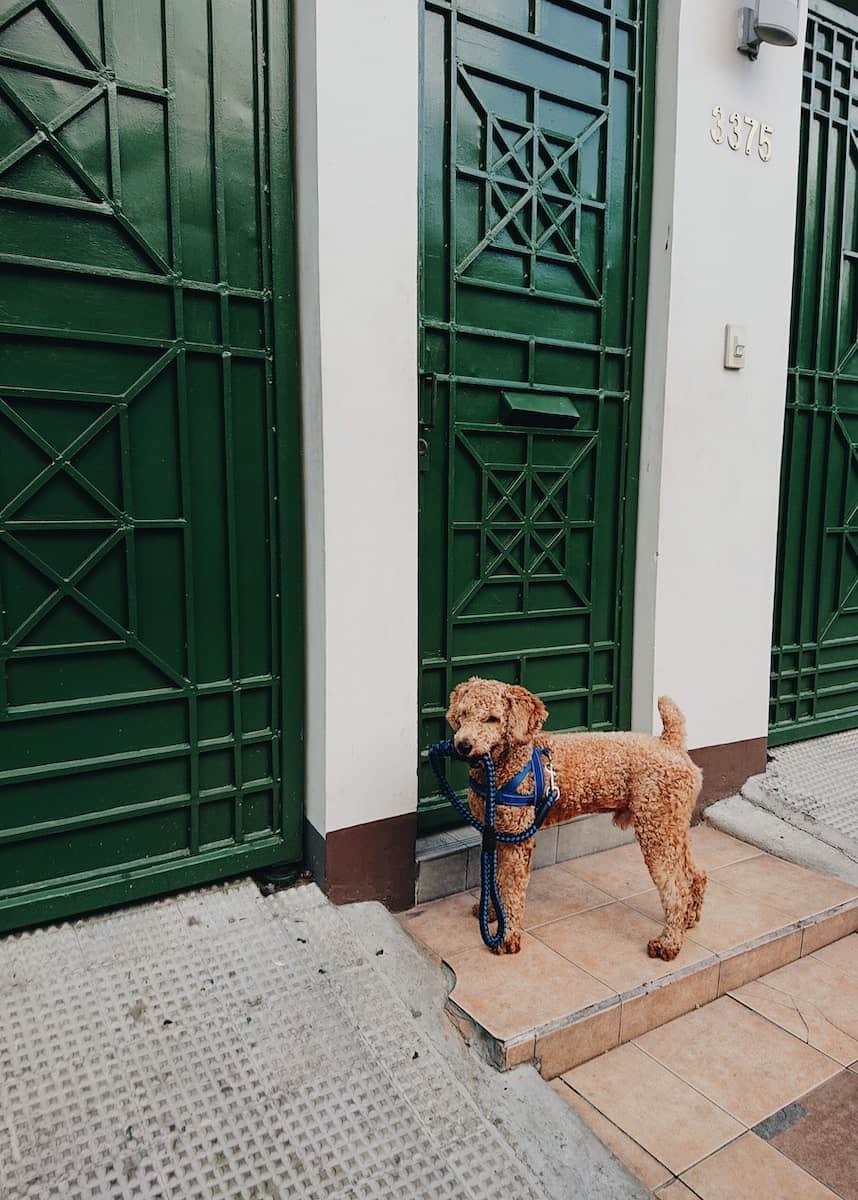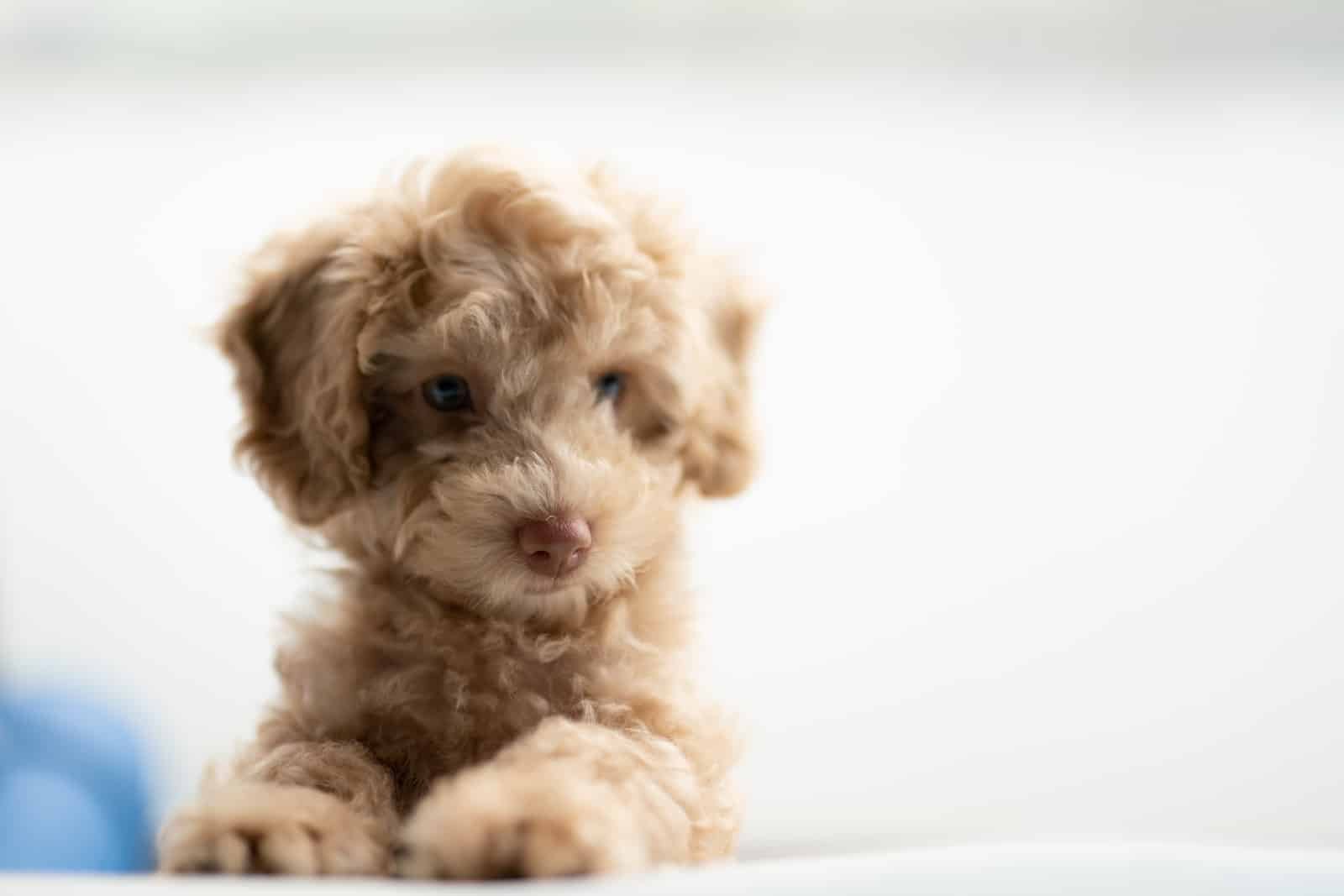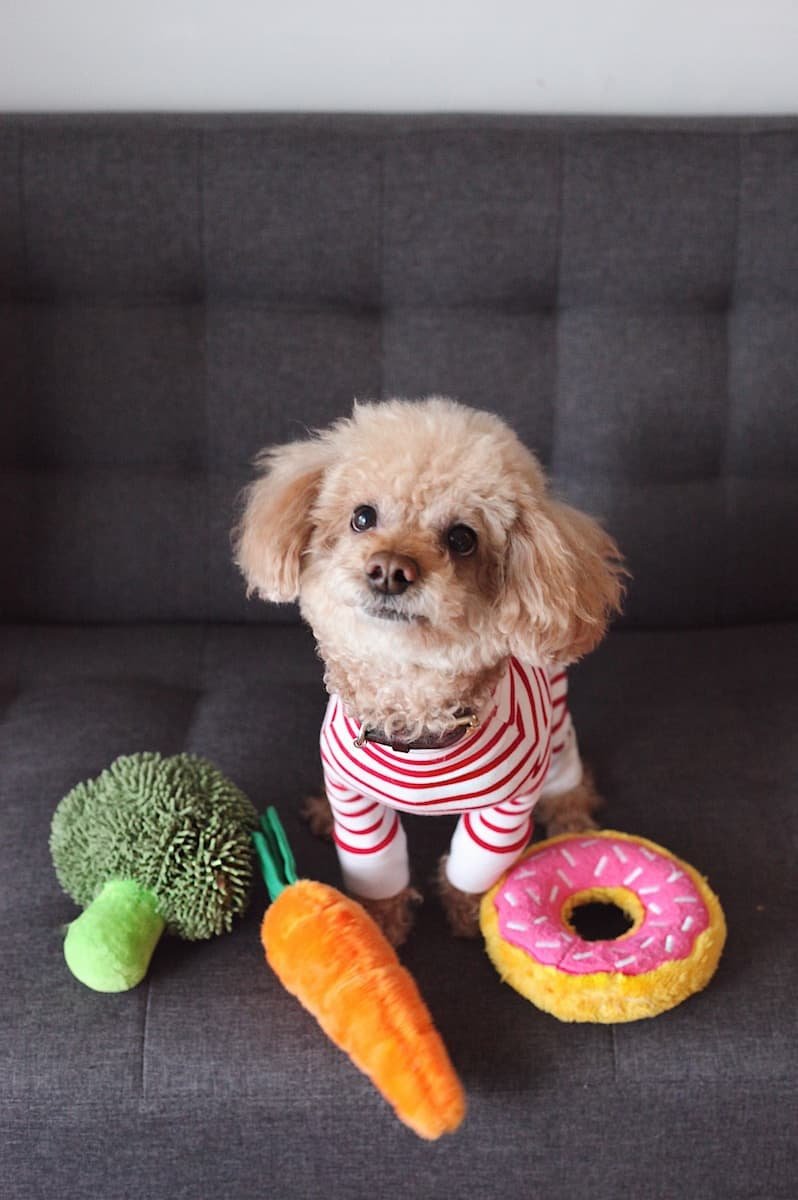
Are you looking for a fun and loving addition to your family? Then look no further than the poodle puppy! With their cheerful dispositions, intelligence, and a wide range of sizes, it’s easy to see why poodles are one of the most popular breeds in the world. In this article, we will explore everything you need to know about these beloved puppies—from their physical characteristics to their behavior and health considerations.
Poodles are a popular breed known for their intelligence and low-shedding coat. This breed offers far more than brains and a low shedding level, though!
Poodles are active dog breeds with a lot of energy and affection, eager to please their owner. Whether you’re potty training them or teaching them unique tricks, they receive instructions efficiently.
If you believe a poodle is a perfect match for your home, learn about how to adopt one with these helpful tips.
What is a Poodle?
Poodles are a family of dogs that come in three different sizes: standard, miniature and toy. Standard poodles stand up to 24 inches tall, while the miniature and toy varieties typically reach heights between 10 and 15 inches. Despite their small size, these dogs have an incredibly high energy level, which makes them great for families with active lifestyles. Poodle puppies are known for being highly intelligent, making them easy to train.
Poodles also have a reputation for being low-barking dogs, although this may depend on the individual dog’s personality type. In terms of health considerations, recent genetic analysis has revealed that poodle puppies may be at a 16.2-fold higher risk for certain eye disorders and immune-mediated disorders than other common breeds like Yorkshire Terriers or Labrador Retrievers. Orthopedic disorders may also be more common in certain poodle lines.
When choosing a poodle puppy, it’s important to find a reputable breeder who is committed to responsible breeding practices—one who grades their dogs according to breed standards and uses only healthy parent stock in their breeding program. With the right breeder your puppy will come from good genetic stock and will weigh between 40-50 pounds when fully grown.
Popularity of the Poodle Breed
The popularity of the poodle breed is undeniable. These curly-haired, lively, and intelligent dogs have long been a beloved pet for families around the world. Poodles come in three sizes—standard, miniature, and toy—allowing pet owners to find a dog that fits their lifestyle. They are known for being easy to train and low-barking, and recent genetic studies suggest that poodle puppies may be at an increased risk for certain eye disorders and immune-mediated diseases.
Because of their intelligence and friendly demeanors, poodles make loyal companions for families of all sizes. A responsible breeder should be able to provide you with detailed information about the parent stock used in their breeding program, as well as any genetic tests performed on the puppies’ lineage. With the right care and attention, your poodle puppy can grow into a loving and devoted companion, who will bring joy to your life for years to come.
Poodle puppy facts
Poodle puppies are one of the most popular breeds of dogs. These curly-haired pooches are known for their intelligence and friendly personalities, making them great family pets. Poodles also have low-barking tendencies and can be easy to train with consistent positive reinforcement.
Recent genetic studies have showed that poodle puppies may be at an increased risk for certain eye disorders and immune-mediated diseases. For this reason, it is important to purchase your puppy from a reputable breeder who can provide detailed information about the parent stock used in their breeding program, as well as any genetic tests performed on the puppies’ lineage.
The size of standard poodles ranges from 18-20 inches tall and weighs between 40-50 pounds; while miniature poodles measure under 15 inches tall and toy poodles only 10 inches tall. Grooming needs should also be taken into consideration when owning a poodle puppy, as they require regular brushing to prevent matting and knots in their fur. With the right care and attention, your poodle puppy can grow into a loving companion who will bring joy to your life for years to come.
Popular Types of Poodle Puppies
Poodle puppies come in a variety of sizes and colors, making them one of the most popular breeds of dogs. Standard poodles are known for their intelligence and friendly personalities, while miniatures and toys are ideal for small living spaces. All three types require consistent grooming to prevent matting and knots in their fur.
The Yorkshire terrier is a toy-sized poodle with a long, silky coat. This breed is energetic and independent, but can also be loyal companions with proper training. Labradors are the largest type of poodle, measuring between 18-20 inches tall and weighing up to 50 pounds. These intelligent dogs are great family pets who will enjoy playing fetch or cuddling on the couch.
Dutch flat-coated retrievers have an athletic build with a soft curly coat that requires frequent brushing to keep it looking its best. This breed is highly active and needs plenty of exercise each day to stay healthy.
No matter which type of poodle puppy you choose, it’s important to do your research beforehand and make sure you purchase from a responsible breeder who performs genetic tests on their parent stock before selling puppies with grades. With the right care and attention, your poodle puppy can bring joy to your life for years to come!
Standard Poodle
The Standard Poodle is a large breed of dog that typically stands between 18 and 24 inches tall and weighs 40-50 pounds. They have a curly coat which requires consistent grooming to prevent matting and knots in their fur. The Standard Poodle is known for its intelligence, loyalty, and friendly personality.
Standard Poodles are highly active dogs who need plenty of daily exercise to stay healthy. This breed loves to play fetch or cuddle on the couch with their owners. They are also very protective of their families, making them excellent watchdogs.
Genetic analysis has shown that Standard Poodles may be at a 16.2-fold higher risk for certain eye disorders compared to other breeds, as well as immune-mediated disorders and orthopedic issues. It’s important to purchase from a reputable breeder who performs genetic tests on their parent stock before selling puppies with grades. With the right care and attention, your Standard Poodle will bring joy to your life for many years!
Miniature Poodle
Miniature Poodles are a small breed of dog that typically stands between 10 and 15 inches tall and weighs 8-18 pounds. They have a curly coat similar to the Standard Poodle, but come in a variety of colors including black, white, apricot, red and silver. Miniature Poodles are known for their intelligence, high energy level, and loving personalities.
Miniature Poodles need plenty of daily exercise to stay healthy and should be walked regularly or taken on longer hikes if possible. This breed loves to play fetch or cuddle with their owners, but can become destructive if left alone for extended periods of time. They also bark more than other breeds, so it’s important to properly train them from an early age.
Recent research has shown that Miniature Poodles may be at higher risk for certain eye disorders compared to other breeds, as well as immune system disorders and orthopedic issues. Before purchasing a puppy, it’s important to find a responsible breeder who performs genetic tests on parent stock before selling puppies with grades. With the right care and attention, your Miniature Poodle will bring joy into your home for many years!
Toy Poodle
Toy Poodles are a small breed of dog that typically stands between 8 and 10 inches tall and weighs 4-6 pounds. With the same curly coat as their larger counterparts, Toy Poodles come in a variety of colors, including black, white, apricot, red, and silver. Known for their intelligence and loving personalities, Toy Poodles also have an impressive energy level, despite their size.
Regular daily exercise is important to keep your Toy Poodle healthy and happy. They love to play fetch or cuddle with their owners, but can become destructive if left alone for extended periods of time. They tend to bark more than other breeds, so it’s important to properly train them from an early age.
Recent studies have shown that Toy Poodles may be at 16.2-fold higher risk for certain eye disorders compared to other breeds and immune-mediated disorders and orthopedic issues. To ensure the healthiest puppy possible, it is essential to purchase from a reputable breeder who performs genetic analysis on parent stock before selling puppies with grades. With the right care and attention, your Toy Poodle will bring joy into your home for many years!
Physical Characteristics of a Poodle Puppy
Poodles, with their distinctive curly coat, come in three different sizes: Standard, Miniature, and Toy. Poodle puppies are small, but grow quickly in the first year of life. A standard poodle can reach 15 inches or more at the shoulder and weigh up to 40-50 pounds when fully grown. Miniature and Toy poodles are smaller, with the miniature reaching a maximum height of 15 inches and weighing 15-20 pounds, and toys reaching a maximum of 10 inches high and 5-8 pounds when full grown. Poodle puppies come in several colors, including black, white, blue, silver, gray, apricot, red and even parti-colored coats. Although all sizes have similar traits such as intelligence, hypoallergenic fur coats and an impressive energy level despite their size; toy poodles tend to bark more than other breeds so it’s important to train them from an early age.
Size and Weight Range
Poodles are usually divided into three size categories: Standard, Miniature and Toy. While all sizes have similar traits, they vary in terms of size and weight. Standard poodles typically reach 15 inches or more at the shoulder and can weigh up to 40-50 pounds when fully grown. Miniature poodles are slightly smaller, with a maximum height of 15 inches and weighing between 15-20 pounds. Toy poodles are the smallest variety, reaching a maximum of 10 inches high with a weight range of 5-8 pounds.
Poodles are known for their intelligence and energetic personality despite their small size. They also possess hypoallergenic fur coats that make them great family pets. However, toy poodles bark more than other breeds, so it’s important to train them from an early age to ensure proper behavior. If you’re looking for a loyal companion in a small package, then consider getting a toy or miniature poodle puppy!
Poodle Puppy Behavior
Poodle puppies are known for their intelligence and loyal personalities. They will make wonderful family pets since they have hypoallergenic coats and are of smaller stature. Although all sizes of poodles have similar traits, toy poodles have higher energy levels than other breeds, as well as a higher tendency to bark. This makes it important to train your toy poodle pup from an early age in order to help them learn proper behavior.
Poodles are also prone to a variety of health problems because of their genetic makeup, including eye disorders, immune-mediated disorders, and orthopedic disorders. A study published in the journal BMC Genetics found standard poodles had 16.2-fold higher risk of developing hip dysplasia compared with other breeds tested in the study. It is important for pet owners looking into getting a poodle puppy to consult with reputable breeders and ensure they are getting a responsible breeder who will provide dogs with grades that show good health. Popular breeds include the Yorkshire Terrier, Labrador Retrievers, and Dutch Flat-Coated Retrievers, while a recent genome-wide association study has identified genetic factors associated with coat color in Poodles.
Are Poodle Puppies Good Family Pets
Poodle puppies can be a wonderful fit for your family. These intelligent, trainable and loyal dogs make excellent companions for both adults and children alike. They are also hypoallergenic, so they are a superb choice for people with allergies.
Poodles are incredibly smart, and eager to please. This makes them the perfect pet for families who want to have an obedient dog that responds well to commands. Although toy poodles may have a higher tendency to bark, with proper training and socialization, this behavior can be lessened.
Poodle puppies can be great family pets because of their perception, loyalty, and hypoallergenic fur coats. It is important to consult with reputable breeders when getting a poodle puppy and ensure they are getting a dog with good grades that show good health. Puppies tend to have higher “playful” energy levels than other ages, so it’s important to train your pup early to help them learn acceptable behaviors.
Energy Level and Barking Level
Poodle puppies are known for their high energy level, which can make them great playmates for kids. However, it’s important to remember that all breeds have different energy levels. Toy poodles are among the most energetic of all poodles, while standard poodles may have a lower energy level. Training and providing plenty of exercise can help keep your pup’s energy levels in check.
When it comes to barking, poodle puppies are considered being on the quieter side compared to other breeds. However, some dog owners have noticed their dogs barking more than average. If you’re concerned about your pup’s barking level, it may be helpful to consult with an experienced animal behaviorist or trainer who can advise on how to manage excessive barking. With proper training and socialization from an early age, your pup should learn how to bark only when necessary or appropriate.
Health Considerations for a Poodle Puppy
Poodle puppies are considered having an excellent health record, but there are still some considerations when it comes to their specific health needs. For instance, small poodle breeds such as the miniature and toy poodles may be at an increased risk of eye disorders because of their size. Studies have also shown that poodle puppies may be 16.2-fold more prone to immune-mediated disorders than other breeds. Some orthopedic disorders, such as hip dysplasia, can affect poodles even with proper care and nutrition.
For potential pet owners who are considering getting a poodle puppy, it’s important to find a reputable breeder who follows responsible breeding practices and can provide information on the genetic factors of the pup they are offering. Dogs with grades 2 or 3 hips should not be bred, as this increases the risk of passing on any orthopedic issues. As always, regular vet visits and preventive health care will help ensure your pup’s long-term well-being.
Genetic Analysis and Eye Disorders
Genetic analysis is a key factor in determining the health of poodle puppies. Research has shown that certain breeds, such as miniature and toy poodles, have an increased risk of eye disorders because of their size. A genome-wide association study found that three breeds Yorkshire Terrier, Labrador Retriever, and Dutch flat-coated retrievers; which had significantly increased odds of developing glaucoma. This suggests that genetic factors play an important role in these types of eye conditions.
Besides genetic testing for potential diseases or disorders, responsible breeders should also provide information on any other hereditary issues that may be passed down to the puppy. For instance, some poodle puppies may be at risk for hip dysplasia, a common orthopedic disorder that affects large dogs weighing 40-50 pounds or more. With proper care and nutrition, this can often be prevented or managed effectively if caught early enough by regular vet visits and preventive health checks.
Immune-Mediated Disorders and Orthopedic Disorders
Immune-mediated disorders and orthopedic disorders are two types of conditions that can be found in poodle puppies. Immune-mediated disorders occur when the body’s immune system mistakenly attacks healthy cells, resulting in organ damage. Common symptoms include vomiting, diarrhea, weight loss and poor growth. In severe cases, the disease can cause death. It is important to identify these diseases quickly so they can be treated before they become life-threatening.
Orthopedic disorders are another type of condition that poodle puppies may experience due to their size and breed-specific genetic predispositions. The most common orthopedic disorder is hip dysplasia, which affects dogs with larger frames and is caused by abnormal hip joint development or instability. Other conditions, such as elbow dysplasia, luxating patellas, and Legg-Calve-Perthes Disease (LCPD) may also develop in poodle puppies if not addressed early on. Responsible breeders should always provide information about any hereditary issues that might affect the puppy’s health later on in life. If caught early enough through regular vet visits and preventive health checks, many of these orthopedic conditions can be managed effectively with proper care and nutrition.
Adopting a Poodle Puppy
You can find poodles up for adoption at your local animal shelter, though it’s best to search for breed rescues specializing in poodles.
Even if you plan to adopt, there are fees you’ll need to pay to cover standard veterinary care, which includes spaying/neutering and vaccinations. Expect to shell out between $300 to $600, as it’s unlikely to find free poodles from rescue groups or people re-homing their dogs.
You might also come across an adoption fee to ensure that the Poodle is going to a home that affords its level of care. Also, there will be an interview and screening process before paying any fees for rescue groups or shelters to know that you are a suitable owner. The Poodle you plan to adopt may most likely have other interested parties, so shelters will have to narrow their choices.
You can begin your search in your local animal shelter or online.
- Poodle Club of America is a national breed club sanctioned by the American Kennel Club. The website has a section where you can find breeders and rescues for poodles.
- Petfinder is a national rescue website for those looking for all kinds of pets and breeds to adopt. Head to their search feature so you can find poodles based on the breed and your location.
- Adopt a Pet is like Petfinder, where you can find shelters and rescues based on your area and the breed you want to adopt.
Finding a Reputable Poodle Breeder
Finding a reputable breeder for your new puppy is an important step in ensuring that your pup gets off to the best possible start. When searching for a breeder, it is important to look for one who is knowledgeable and experienced with the breed you are looking for. Reputable breeders should be able to provide information about the puppy’s parents, health clearances and genetic testing results. They should also be willing to answer questions you may have about the breed and provide ample information about proper care and nutrition.
When visiting a potential breeder, look out for any signs of overcrowding or unsanitary conditions, as this can indicate neglect or poor breeding practices. Make sure that any puppies onsite appear healthy and well-socialized before committing to anything. Finally, ask if there are any guarantees provided with the purchase of a puppy such as health checks or vaccinations prior to taking it home. Taking these steps will help ensure that your new pup is happy and healthy for years to come!
Dogs with Grades, Yorkshire Terrier, and Dutch Flat-Coated Retrievers
Dogs with grades are an increasingly popular breed of canine. These dogs are judged based on their appearance and temperament, giving them a numerical score of 1-10. The highest grade is 10 and the lowest is 0, with most dogs ranging from 4 to 7. Yorkshire Terriers and Dutch Flat-Coated Retrievers are two of the more common breeds that receive grades.
The Yorkshire Terrier typically earn high scores for their small size and friendly personality. They usually stand no taller than seven inches when fully grown and weigh between four to seven pounds. Their coats come in a variety of colors, such as black, blue, tan, and silver, making them a favorite among pet owners.
Dutch Flat-Coated Retrievers have an average height of 22 to 24 inches at the shoulder and can weigh anywhere between 40 to 50 pounds when fully grown. They are also known for their intelligence and loyal nature, which can make them great family pets. Their coats come in shades of brown or black, as well as solid white or yellowish white markings around the eyes, nose, cheeks, chest, belly area, legs, and tail tip.
Both breeds have been studied extensively by geneticists who have discovered a 16.2-fold higher risk for eye disorders in dogs with grades lower than 6 compared to those with higher grades. A recent genome-wide association study has identified several genetic factors associated with immune-mediated disorders that affect both Yorkshire Terriers and Dutch Flat-Coated Retrievers alike. It is important to find a responsible breeder who can provide health clearances before bringing home any puppy so you can avoid any potential health issues down the line!
Purchasing Poodles from a Breeder
With the rise in popularity of certain breeds, it is important to ensure that puppies are bred responsibly with careful consideration of their genetic makeup. This means that reputable breeders should be able to provide detailed information about their dogs’ pedigrees and should test their breeding stock for any potential genetic disorders. They should also be able to discuss any health issues or orthopedic disorders that may be present in the breed.
It is also important to consider the energy level and barking level of your chosen breed when selecting a puppy. While some dogs may have higher energy levels than others, all puppies need exercise and stimulation to stay healthy. Some breeds may bark more than others, so make sure this won’t be an issue if you live in an apartment complex or have other noise restrictions.
Details describing the caliber Poodle puppy aren’t always available. Take your time, perform research for a respectable dog breeder. Reputable breeders have their dog’s attention in mind and focused on the dog’s well-being. They should inquire about the living conditions in mind for the puppy to glean insight into its future welfare.
Here are several tips to assist in your quest for a respectable poodle breeder.
- Visit a vet and ask if there is someone they can refer to you. A respected dog breeder visits the vet regularly and sees that his animals are cared for correctly.
- Reach out to The Kennel Club, such as their American Kennel Club. The AKC National Breed Club has a list of poodle breeders by locale.
- Ask relatives, buddies, along with other poodle owners, you know.
- You might also visit dog shows, pet shops, and dog parks. They’ll gladly share their experience and contact details with you.
- Ask your potential breeder everything you would like to know about the breed.
- Ask about the pet’s history and how often a year the specific puppies’ mother is bred. If possible, try to visit both parents of the litter.
- Inquire if the breeder has tested the parents to get any congenital diseases. These tests will help understand the potential of these puppies can develop genetic disorders like hip dysplasia, joint problems, allergies, and eye problems as they grow old.
- Throughout the walk-through, note/pay attention to the environment and how puppies are treated and cared for. Look for signs of neglect as well as an environment to thrive.
- Is the environment a clean and comfortable place for the puppies? Are the litter of puppies and their mother in optimal health?
- Ask also if they’ve completed their vaccinations against rabies, parvovirus, along with other vaccines required by law.
- A respectable breeder should ask questions regarding your way of life, work, daily life, family, etc. That should ensure you provide what the dog needs to grow happy and healthy.
Ask About Previous Owners or Families
Remember that adopting a Poodle is different compared to purchasing one from a reputable breeder. Poodles, like other dogs up for adoption, end up in shelters for various reasons. It can be due to illness, behavior problems, owners moving.
Ask the rescue or shelter you are adopting from about the Poodle’s past along with current issues they may have addressed or treated. You are looking for any mental or physical health issues the dog may have. Doing this will help provide history and understanding when bringing your new pet back home and how to provide him with a healthy life with an affectionate family.
Asking these questions can provide an idea of the shelter’s customer service as you speak with their service providers. It lets you know more about how the shelter and organization handle their rescues and whether you should move on with the adoption process.
Learn About Their Health
Sometimes, a Poodle up for adoption may have health or behavioral issues. You will need to ask the shelter for any health issues the Poodle has or is at risk of having.
Most likely, shelters took their rescues for veterinary screening to check their vital organs, behavior, and any illnesses, giving health clearances once done. You can also have the Poodle go through applicable health screens, though you may need to cover the fees for it.
Knowing the Poodle’s health will help you figure out what type of care you need to give him once he arrives home.
Poodles are at risk for certain health conditions, such as Addison’s disease, hip dysplasia, bloat, and poor joint health. Living normal lives with proper diet and exercise can live up to 10-18 years on average.
Have a Practical Puppy Training Plan
Poodles are adaptable, obedient, intelligent, and friendly, and that all equals to the suitable family pet that’s easily trainable. Through proper training, you won’t have any behavior issues and keep them in optimal health.
However, Poodles can also be stubborn, especially if you don’t train them well! That’s why you need a practical puppy training plan while they are still young.
When you bring your new Poodle home, give him time to adjust to his new day life. You will need patience for this, as it takes a few weeks until your new pet is comfortable with you and his surroundings.
Once you believe he’s ready, it’s time to begin training. Start by teaching him his name, then follow up with house training and basic commands such as sit, stay, come, and lie down.
After he has mastered all the basic commands, you can begin agility and obedience training, along with teaching him more complex commands. Training is beneficial for the intelligent Poodle, as it works his mind and body.
Give Them Mental Stimulation
Speaking of working the mind of an intelligent poodle, make sure you give him tons of mental stimulation. Even while you’re out, occupy your Poodle with fun toys that work his mind. Puzzles, chew toys, and interactive ball toys are great suggestions.
And don’t forget to give your Poodle his daily exercise, spending time together will help grow your relationship and his trust, as well as keep him in optimal health.
Coat Grooming and Care Needs
Poodles are fantastic choices for people with allergies because they have a low-shedding coat. The low shedding level lessens the presence of pet dander and fur around the house, so allergic people don’t get triggered with the Poodle playing around the house.
However, this will mean a lot of coat grooming care and maintenance! You don’t need to bathe them every day, but you should brush their coat 2-3 times a week to prevent matting and trapped hair in their coat, which is uncomfortable for the dog.
Bathe your dog every 3-4 weeks, which keeps your dog’s fur clean and his skin in optimal health. Choose the appropriate dog shampoo depending on your dog’s hair and skin type.
You can also head to a professional groomer to brush and bathe your dog, as well as give him a fabulous hairstyle! The fees will cost a bit more than purchasing the grooming equipment and tools, doing it yourself.
Food and Water Needs
Diet is crucial when caring for your dog, as the proper diet will keep him at optimal health.
Check with the veterinarian to identify the types of food your Poodle shouldn’t have as well as what they should have, based on his age and current condition. You can also ask the breeder or local shelter regarding the Poodle’s eating habits and favorite food. Maintain the dog’s regular diet, as changing his food drastically after adoption will affect his digestive system, causing an upset stomach.
Adult poodles can eat once a day, though this depends on their level of tolerance. You may want to start with 2-3 appropriately-sized meals a day, with a few treats here and there.





